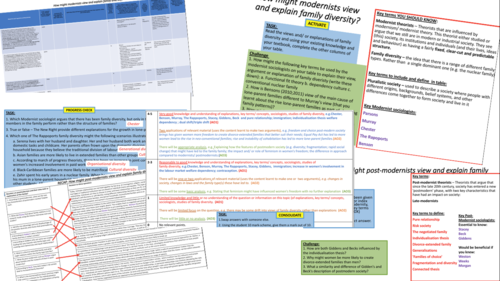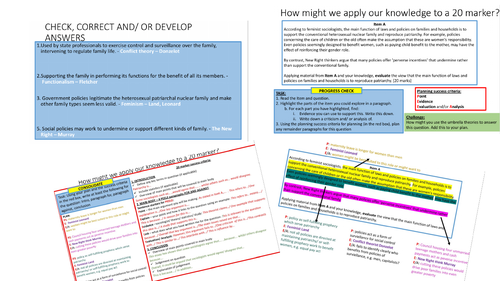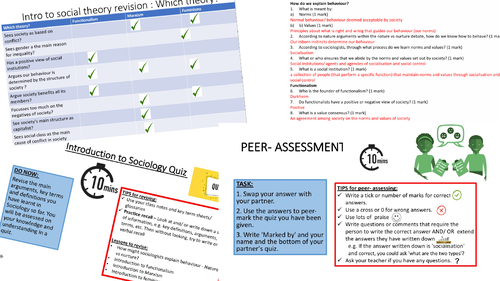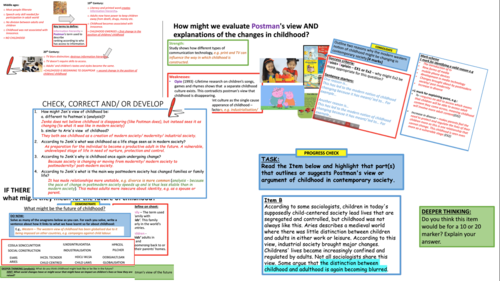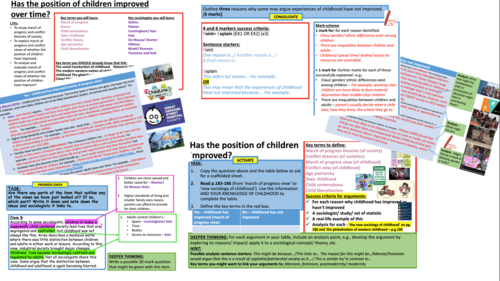
184Uploads
25k+Views
5k+Downloads
All resources

AQA A-level Sociology: Families Topic 5 ‘Changing family patterns’ Revision lesson
Detailed and differentiated (up and down) student led lesson that
recaps changing family patterns learnt of Family Topic 5 and the reasons for them.
allows students to develop their AO2 (application) and AO3 (analysis) skills by considering the relationship changing family patterns might have with other aspects of the topic, as well as other topic in families and household, such as the domestic division of labour (couples), experiences of childhood (childhood), the characteristic of populations (demography).
***This part of the lesson is very helpful for developing the skills students need for to answer ‘Outline and explain’ 10 markers which requires students to demonstrate the ability to connect two elements, aspects, subtopics, or topics to answer the question. *
concludes by requiring students to apply this knowledge to ‘outline and explain’ 10 markers and one item 10 marker.
RESOURCES CAN BE FOUND AT THE END OF THE PPT.
ANSWERS FOR MOST OF THE ACTIVITIES CAN BE FOUND ON NEXT SLIDE AFTER ACTIVITY SLIDE

AQA A-level Sociology: Families Topic 6 ‘Family diversity’ Revision lesson
Detailed and differentiated (up and down) student led lesson that aims to recap and consolidate student’s knowledge and understanding of:
key sociologists (Parsons, Murray, Chester and Benson, Stacey, Beck, Giddens and more)
key terms (Rapoports’ different types of diversity, neo-conventional Pure relationship, Risk society, negotiated family, individualisation thesis, Divorce-extended family, 'Families of choice’, Fragmentation and diversity, Connected thesis and more) in the family diversity topic of the family unit.
the main difference in modernist and postmodernist views of: society, the family AND explanations of family diversity.
INCLUDES STUDENT FRIENDLY MARK-SCHEME FOR 10 MARKER ON THIS TOPIC
RESOURCES CAN BE FOUND AT THE END OF THE PPT.
ANSWERS FOR MOST ACTIVITIES (Recap and planning activity) INCLUDED AND CAN BE FOUND ON NEXT SLIDE AFTER ACTIVITY SLIDE
INCLUDES ORACY ACTIVITY

AQA A-level Sociology: Families Topic 7 ‘Families and Social policy’ Revision lesson
Detailed and differentiated (up and down) student led lesson that:
briefly recaps the main theories (Feminism, The New Right, Conflict theory, Functionalism) and theorists (Donzelot,Murray, Fletcher, Land & Leonard) and their views on the function of social policies and the relationship between families and social policies and.
models and supports students in using this knowledge to plan (using a planning success criteria) and answer (using a paragraph success criteria) a 20 marker USING THE ITEM.
RESOURCES CAN BE FOUND AT THE END OF THE PPT.
**ANSWERS FOR MAIN ACTIVITIES CAN BE FOUND ON NEXT SLIDE AFTER ACTIVITY SLIDE
**

AQA A-level Sociology: Education Revision Notes
Detailed revision notes that covers all topics (1-6) in education:
Class differences in achievement (internal and external factors)
Ethnic differences in achievement (internal and external factors)
Gender differences in achievement, subject choice and experiences in school (internal and external factors)
Role of education
Educational policy
Includes an evaluation point for most if not all arguments.
NOT EDITABLE - PDF document
Includes contents page

Introduction to Sociology QUIZ
Includes:
small revision activity
25 min quiz (on nature vs nurture, key functionalist, Marxist, feminist’s ideas and terminology) —LESSONS CAN BE FOUND ON MAIN PAGE.
answers/ mark-scheme
scaffolding for students to peer assess (but quiz can also be marked by teacher)
Can be used for any spec
Made for A-level students but can be differentiated down for GCSE.

Sociology Education Class diff in achievement (external & internal) Folder organisation lesson
Explores the importance of organisation and guides and supports students in organising their classwork for class differences in achievement external and internal factors (Topic 1& 2 AQA A/ AS-level spec)
Includes:
Assessment tracker
Example of how folder might be organised
Reflection activity
Education folder dividers - to help students separate and organise their class and home learning.
Made for AQA A/AS-level Sociology but can be used for ANY SPEC

AQA A-level Families- Couples: Women’s involvement in paid work
Detailed and differentiated (up and down) student-led lesson that examines and analyses the following key terms to examine march of progress and feminist views of how women’s involvement paid work has had an impact on the domestic division of labour:
Dual‐earner couples, The New man, The ‘march of progress’ view
Double shift / dual burden, Triple shift, Emotion work, Cultural/ Ideological explanation (of segregated conjugal roles), Material/ Economic explanation (of segregated conjugal roles)
Ideology, Geographic mobility (extension), Commercialisation (extension)
Examines the ideas of :Young and Wilmott, Oakley, Hochschild , Gershuny/ Sullivan, Ferri and Smith, Crompton and Lyonette
***** Makes reference to other key terms students might know that link. **
****ALL RESOURCES INCLUDED AND CAN BE FOUND OUT THE END OF PPT ***
Uses and refers to ’ AQA A Level Sociology Book One Including AS Level: Book one 3rd Revised edition by Rob Webb, Hal Westergaard, Keith Trobe, Annie Townend ’ textbook

AQA A-level Families- Couples: Intro to the family structures/ types
Detailed and differentiated (up and down) student-led lesson that examines and analyses the following key terms to introduce students to the main family structures: Family, Household,Family structure/ type, Nuclear family, Lone-parent family, Same-sex family, Reconstituted family (or blended family) , Beanpole family, Extend family (horizontally and vertically) , Empty-nest family, Cohabitating couples, Contemporary society, Traditional, Family diversity, Living Apart Together/ LATs (extension)
***** ANSWERS for MOST MAIN activities INCLUDED****
***** ALL RESOURCES INCLUDED AND CAN BE FOUND OUT THE END OF PPT *****

A-level AQA Families Topic 2 Childhood– The future of childhood
Detailed and differentiated student-led lesson that explores Information hierarchy , Postmodernity/ postmodern society/ contemporary society, Modernity/ modern society/ industrial society, Accordion family, Boomerang children as a way to examine the changes to the modern western notion of childhood in contemporary society. Covers the views of Postman and Jenks.
Activities require pages from the AQA A Level Sociology Book One Including AS Level: Book one 3rd Revised edition by Rob Webb, Hal Westergaard, Keith Trobe, Annie Townend
RESOURCES CAN BE FOUND AT THE END OF PPT
ANSWERS INCLUDED FOR MAIN ACTIVITIES
**INCLUDES EXAM QUESTIONS **

A-level AQA Families Topic 2 Childhood- Has the position of children improved over time?
Detailed and differentiated student-led lesson that explores march of progress theory, Toxic childhood, Conflict theory, Age patriarchy, Child liberationism as a way to examine the different views (march of progress and conflict views) of whether childhood has improved over time. Includes views of Gittins, Palmer, Firestone and Holt, Aries etc.
Main activity requires pages from the AQA A Level Sociology Book One Including AS Level: Book one 3rd Revised edition by Rob Webb, Hal Westergaard, Keith Trobe, Annie Townend
ANSWERS INCLUDED FOR MAIN ACTIVIES
RESOURCES CAN BE FOUND AT THE END OF PPT

AQA A-level Sociology: Education Topic 3 Ethnic differences - Institutional racism
Detailed and differentiated (up and down) student led lesson that explores the following so students are able to understand institutional racism and explain how it might cause ethnic differences in achievement: Institutional racism, Marketisation (extension), The New IQism, Ethnocentric, Ethnocentric curriculum, Model minorities, The foundation stage profile (FSP), Aim Higher initiatives/ programmes
Covers the ideas of Troyna and Williams Gillborn, David, Ball, Sewell (as a criticism)
Covers criticisms of Gillborn’s arguments
Includes answers for MOST activities - NOTE - NO ANSWERS FOR ‘DO NOW’ but can be done on the board with students.
Makes some links to the following key terms students should know:
Internal vs External factors, Cultural vs Material factors, Social processes, Labelling, Streaming, Self-fulfilling prophecy
NOTES:
-Uses and refers to ’ AQA A Level Sociology Book One Including AS Level: Book one 3rd Revised edition by Rob Webb, Hal Westergaard, Keith Trobe, Annie Townend ’ textbook
-RESOURCES CAN BE FOUND AT THE END OF THE PPT.

AQA A-level Sociology Education Topic 5 Role of education - The New Right view
Detailed student led lesson on the New Right critique and view of the purpose state education adapted to stretch and challenge the most able whilst scaffolding to allow pupils who need support the opportunity to access higher level thinking.
Covers the following key terms:
Neo-liberalism
The New Right
Conservatives
Voucher system
One-size-fits-all approach
League tables
Ofsted reports
National curriculum
Marketisation
Privatisation
Academies
Free schools
State schools
Social policies
Covers the following key sociologists: Chubb and Moe
Uses and refers to ’AQA A Level Sociology Book One Including AS Level: Book one 3rd Revised edition by Rob Webb, Hal Westergaard, Keith Trobe, Annie Townend ’ textbook
BRIEF ANSWERS TO THE MAIN ACTIVITY INCLUDED
NOTES -RESOURCES CAN BE FOUND AT THE END OF THE PPT.

GCSE Intro to Sociology QUIZ
Includes:
small revision activity –that looks at the similarities and differences between functionalism, Marxism and feminism
25 min quiz (on basic sociological concepts, key functionalist, Marxist, feminist’s ideas and terminology)
answers/ mark-scheme for quiz
scaffolding for students to peer assess (but quiz can also be marked by teacher)
SAME as A-level intro quiz but excludes questions on the nature – nurture debate.
Can be used for any spec

AQA GCSE Sociology - Research Methods: What PET issues might sociologists consider for research?
Detailed lesson with lots of scaffolding based on adaptive teaching that help students understand what are PET issues that sociologists consider when designing and conducting research (e.g. define and identify possible practical, ethical and theoretical (PET) advantages and disadvantages of social research and explaining PET’s differences
Covers the following key terms: Practical issue, Ethical issues, Theoretical issues,Anonymity, Confidentiality , Informed consent, Covert research (extension), Pseudonym (extension), Mixed method (extension) Findings (of research) (extension).
Key bodies, laws and theories we will cover: British Sociological Association, Data Protection Act 1998, Positivism, Interpretivism
Answers to most main activities are included
Resources can be found at the end of the PPT

AQA GCSE Sociology - Research Methods: How do sociologists collect their data?
Detailed lesson with lots of scaffolding based on adaptive teaching that help students understand how sociologist collect data for sociological research (e.g. difference between primary and secondary methods, quantitative and qualitative data, the strengths and weaknesses of primary and secondary methods, standardisation and social process
Covers the following key terms: research methods, sociological research, data, research process, Primary methods vs Secondary Methods, qualitative vs quantitative data, closed vs open questions, validity and reliability.
Answers to all main activities included
Resources can be found at the end of the PTT

AQA A - level Sociology -Media - what are sociological views on popular culture
Detailed lesson with lots of scaffolding based on adaptive teaching that help students understand what are sociological views of popular culture (e.g. define popular culture, other terms used to refer to it, explain sociological views on popular culture and to analyse and evaluate those views.
Covers the following key terms:
Popular culture
High culture
Low culture
Mass culture
Critical Theory
Social repression (extension)
Social conformity (extension)
Tabloidisation
Infotainment
Key terms you SHOULD know that might come up:
Social control, False consciousness, Profit, Ideology, Dominant ideology/Hegemony, Class inequality, Pluralism, Neo-Marxism, Media products, Media technology, Agenda-setting, Gate-keeping, Lords of a Global village
Covers the following key sociologists: Marcuse, The Frankfurt School, Strinati, Livingston, Curran et al (2009)
**REQUIRES textbook - 'SOCIOLOGY For AQA Volume 2 by Browne, Blundell & Law **
Answers to all main activities included
Includes a 10 marker with three model paragraph plans
RESOURCES AT THE END OF PPT

AQA GCSE Sociology - Research Methods: Questionnaires
Detailed lesson with lots of scaffolding based on adaptive teaching that help students understand how to use questionnaires when investigating sociological issues (e.g. the main features of questions and describe when its appropriate to use, the strengths and weaknesses of questionnaires based on their main features and how to apply our knowledge of the strengths and weaknesses of questionnaires to different sociological research topic.
Examines questionnaires in general and postal questionnaires.
Makes links to practical ethical and theoretical issues.
Covers the following key terms: Questionnaires, Postal questionnaires
Key terms you should know that link:
Quantitative data vs Qualitative data – Reliable vs Valid – Practical issues – Ethical issues – Theoretical issues – Positivism vs Interpretivist – Sample size – Representative sample – Generalise findings - Social surveys – Questionnaire - Pre-determined - Closed questions - Open questions - Postal questionnaires - Online questionnaire
INCLUDES ANSWERS FOR ACTIVITIES
Includes model answer, student friendly mark-scheme and example answers ranging from 1-4/ 4 for a research method 4 marker
RESOURCES CAN BE FOUND AT THE END OF PPT

AQA GCSE Sociology - Research methods: Social surveys
Detailed lesson with lots of scaffolding based on adaptive teaching that help students understand what are the strengths and weaknesses of using social surveys to investigate sociological issues (e.g how to identify the main features of social surveys and when it would be appropriate to use them, explains the strengths and weaknesses of using social surveys to investigate social issues and applies the strengths and weaknesses of social surveys to an exam question).
Covers the following key terms: Social surveys, Telephone surveys
Makes references to key terms students should know that link to this lesson.
Lesson requires students to have prior knowledge of practical, ethical and theoretical issues to the strengths and weaknesses of social surveys
No starter included in the lesson
ANSWERS TO MAIN ACTIVITY ONLY.
Includes an exam question with scaffolding to help students answer.
I used the lesson as an opportunity to write an answer to the 4 marker with students.
Resources can be found at the end of PPT

A-level Sociology Education Class differences in achievement - Labelling
Detailed and differentiated (up and down), student led lesson that explores labelling, self-fulfilling-prophecy/ pygmallion effect, determinism and interactionism to enable students to understand the role of labelling in causing class differences in achievement/ working-class underachievement/ middle-achievement.
**ANSWERS TO MOST ACTIVITIES **
**COMES WITH FREE A-LEVEL HELP SHEET
**Made for AQA A-level but can be easily used for other specs (just need a different source of information/ textbook) **
Uses and refers to ’ AQA A Level Sociology Book One Including AS Level: Book one 3rd Revised edition by Rob Webb, Hal Westergaard, Keith Trobe, Annie Townend ’ textbook

AQA GCSE Sociology: Family - Theories of divorce
Includes a ‘teaching to all’ activity that enables students to recap functionalist, Marxist and feminist views of society so that they can better understand their views on divorce.
Includes a 4 marker with scaffolding to help students answer it. Also includes a annotated 4 marker mark-scheme for self and peer-assessment and to enable students to understand how examiners will mark their 4 marker.
ANSWERS TO ALL ACTIVITIES INCLUDED


